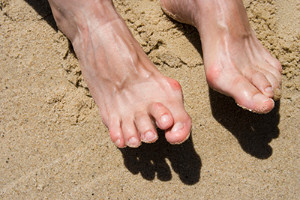
Some athletes continue to feel ankle pain long after a sprain has healed. This ongoing discomfort can be caused by hidden damage inside the joint, like scar tissue or small tears. When rest, targeted exercises, and other treatments do not bring relief, a procedure called arthroscopic surgery may be helpful. It uses tiny tools and a camera to look inside the ankle and fix the problem without large cuts. This kind of surgery can reduce pain and help athletes get back to their sport more safely and comfortably. If you are still having ankle pain after a past injury, it is suggested that you visit a podiatrist to explore the best options for healing, which may include arthroscopic surgery.
Ankle and foot injuries are common among athletes and in many sports. They can be caused by several problems and may be potentially serious. If you are feeling pain or think you were injured in a sporting event or when exercising, consult with one of our podiatrists from CyFair Family Foot Care. Our doctors will assess your condition and provide you with quality foot and ankle treatment.
Common Injuries
The most common injuries that occur in sporting activities include:
- Achilles Tendonitis
- Achilles Tendon Rupture
- Ankle Sprains
- Broken Foot
- Plantar Fasciitis
- Stress Fractures
- Turf Toe
Symptoms
Symptoms vary depending upon the injury and in some cases, there may be no symptoms at all. However, in most cases, some form of symptom is experienced. Pain, aching, burning, bruising, tenderness, tightness or stiffness, sensation loss, difficulty moving, and swelling are the most common symptoms.
Treatment
Just as symptoms vary depending upon the injury, so do treatment options. A common treatment method is known as the RICE method. This method involves rest, applying ice, compression and elevating the afflicted foot or ankle. If the injury appears to be more serious, surgery might be required, such as arthroscopic or reconstructive surgery. Lastly, rehabilitation or therapy might be needed to gain full functionality in the afflicted area. Any discomfort experienced by an athlete must be evaluated by a licensed, reputable medical professional.
If you have any questions, please feel free to contact our offices located in Cypress and Spring, TX . We offer the newest diagnostic and treatment technologies for all your foot care needs.

Overlapping toes can appear at birth or develop later in life. In newborns, the toes may overlap due to positioning in the womb or inherited foot structure. Gentle stretching and taping techniques are often used to encourage proper alignment during infancy. In many cases, the condition improves as the child grows and becomes more active. For adults, overlapping toes frequently result from wearing tight or ill-fitting shoes, arthritis, or long-term foot deformities such as bunions or hammertoes. Discomfort, corns, and difficulty finding comfortable footwear are common complaints. Non-surgical treatments may include wearing wider shoes, using toe spacers, and applying padding to relieve pressure. If pain persists or the overlap interferes with walking, surgical correction may be recommended to realign the toes and restore comfort. Whether the condition affects a newborn or an adult, it is suggested that you see a podiatrist for a proper diagnosis and appropriate treatment plan.
Hammertoe
Hammertoes can be a painful condition to live with. For more information, contact one of our podiatrists from CyFair Family Foot Care. Our doctors will answer any of your foot- and ankle-related questions.
Hammertoe is a foot deformity that affects the joints of the second, third, fourth, or fifth toes of your feet. It is a painful foot condition in which these toes curl and arch up, which can often lead to pain when wearing footwear.
Symptoms
- Pain in the affected toes
- Development of corns or calluses due to friction
- Inflammation
- Redness
- Contracture of the toes
Causes
Genetics – People who are genetically predisposed to hammertoe are often more susceptible
Arthritis – Because arthritis affects the joints in your toes, further deformities stemming from arthritis can occur
Trauma – Direct trauma to the toes could potentially lead to hammertoe
Ill-fitting shoes – Undue pressure on the front of the toes from ill-fitting shoes can potentially lead to the development of hammertoe
Treatment
Orthotics – Custom made inserts can be used to help relieve pressure placed on the toes and therefore relieve some of the pain associated with it
Medications – Oral medications such as anti-inflammatories or NSAIDs could be used to treat the pain and inflammation hammertoes causes. Injections of corticosteroids are also sometimes used
Surgery – In more severe cases where the hammertoes have become more rigid, foot surgery is a potential option
If you have any questions please contact our offices located in Cypress and Spring, TX . We offer the newest diagnostic and treatment technologies for all your foot and ankle needs.

Neuropathic toe ulcers, especially those that expose a joint or bone, can be serious and challenging to treat. Traditionally, these wounds often led to partial or full toe loss. But with advances in foot surgery, there is surgery to spare toes. Toe-sparing procedures aim to remove damaged tissue while preserving as much of the toe structure as possible. By protecting the healthy parts of the toe, patients can maintain better balance and mobility, which reduces the risk of future complications. These surgeries are typically combined with wound care, infection control, and offloading strategies to promote healing and prevent recurrence. If you have a non-healing toe ulcer with exposed bone or a joint, early intervention is key. It is suggested that you schedule an appointment with a podiatrist to learn if this advanced treatment is right for you.
Wound care is an important part in dealing with diabetes. If you have diabetes and a foot wound or would like more information about wound care for diabetics, consult with one of our podiatrists from CyFair Family Foot Care. Our doctors will assess your condition and provide you with quality foot and ankle treatment.
What Is Wound Care?
Wound care is the practice of taking proper care of a wound. This can range from the smallest to the largest of wounds. While everyone can benefit from proper wound care, it is much more important for diabetics. Diabetics often suffer from poor blood circulation which causes wounds to heal much slower than they would in a non-diabetic.
What Is the Importance of Wound Care?
While it may not seem apparent with small ulcers on the foot, for diabetics, any size ulcer can become infected. Diabetics often also suffer from neuropathy, or nerve loss. This means they might not even feel when they have an ulcer on their foot. If the wound becomes severely infected, amputation may be necessary. Therefore, it is of the upmost importance to properly care for any and all foot wounds.
How to Care for Wounds
The best way to care for foot wounds is to prevent them. For diabetics, this means daily inspections of the feet for any signs of abnormalities or ulcers. It is also recommended to see a podiatrist several times a year for a foot inspection. If you do have an ulcer, run the wound under water to clear dirt from the wound; then apply antibiotic ointment to the wound and cover with a bandage. Bandages should be changed daily and keeping pressure off the wound is smart. It is advised to see a podiatrist, who can keep an eye on it.
If you have any questions, please feel free to contact our offices located in Cypress and Spring, TX . We offer the newest diagnostic and treatment technologies for all your foot care needs.

